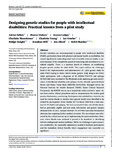Designing genetic studies for people with intellectual disabilities: Practical lessons from a pilot study
| dc.contributor.author | Sellers, A | |
| dc.contributor.author | Hudson, S | |
| dc.contributor.author | Ledger, J | |
| dc.contributor.author | Moorehouse, C | |
| dc.contributor.author | Young, C | |
| dc.contributor.author | Groeber, I | |
| dc.contributor.author | Knight, B | |
| dc.contributor.author | Mill, J | |
| dc.contributor.author | Allard, J | |
| dc.contributor.author | Shankar, Rohit | |
| dc.date.accessioned | 2022-10-18T09:15:38Z | |
| dc.date.available | 2022-10-18T09:15:38Z | |
| dc.date.issued | 2023-06 | |
| dc.identifier.issn | 1741-1122 | |
| dc.identifier.issn | 1741-1130 | |
| dc.identifier.uri | http://hdl.handle.net/10026.1/19703 | |
| dc.description.abstract |
<jats:title>Abstract</jats:title><jats:p>Genetic variations are overrepresented in people with intellectual disability (PwID), particularly those with physical and mental health co‐morbidities, but remain significantly under‐diagnosed. Lack of suitable research studies, a natural extension of the complexities posed of consenting and recruitment is considered culpable. There is a resultant dearth of evidence on establishing bespoke genetic studies for adult PwID. This report outlines the challenges faced in the implementation and administration of a pilot genetic study for adult PwID hoping to better inform future genetic study designs for PwID. Adult participants with a diagnosis of ID (ICD10 F70‐F73) and epilepsy (ICD10 G40) were recruited to The <jats:bold>P</jats:bold>en<jats:bold>i</jats:bold>nsula study e<jats:bold>x</jats:bold>ploring genomic stratification in <jats:bold>i</jats:bold>ntell<jats:bold>e</jats:bold>ctual disability and epilepsy via the ethically approved Royal Devon and Exeter Tissue Bank (RDETB) (16/SC/016). Managed within the National Institute for Health Research (NIHR) Exeter Clinical Research Framework, the RDETB was set up to proactively collect and store ‘spare’ tissue from routine clinical procedures such as venepunctures for routine good practice biochemistry monitoring. Participants who satisfied the criteria for the need for routine bloods to monitor their general health were identified to be invited for participation. From October 2017 to March 2020 from a total caseload of 375 PwID and epilepsy, 291 were screened (77.6%), 116 (39.9%) identified as potentially eligible and sent study information and genetic samples obtained from 30 (8%). Analysis showed 75% of PwID had some biochemical abnormalities requiring further medical attention. The recruitment was influenced by the clinical care set up in implementing the sanctioned ethics. However, where bloods were achieved it proved to be beneficial in identifying hitherto undiagnosed medical problems. While the challenges to gain consent, are considerable, the reasonable adjustments needed to facilitate participation and the immediate clinical benefits where engagement was successful are significant.</jats:p> | |
| dc.format.extent | 158-163 | |
| dc.language | en | |
| dc.language.iso | en | |
| dc.publisher | Wiley | |
| dc.rights | Attribution 4.0 International | |
| dc.rights.uri | http://creativecommons.org/licenses/by/4.0/ | |
| dc.subject | genetics | |
| dc.subject | intellectual disabilities | |
| dc.subject | mental capacity | |
| dc.subject | practice | |
| dc.subject | research | |
| dc.title | Designing genetic studies for people with intellectual disabilities: Practical lessons from a pilot study | |
| dc.type | journal-article | |
| dc.type | Journal Article | |
| plymouth.author-url | https://www.webofscience.com/api/gateway?GWVersion=2&SrcApp=PARTNER_APP&SrcAuth=LinksAMR&KeyUT=WOS:000866097200001&DestLinkType=FullRecord&DestApp=ALL_WOS&UsrCustomerID=11bb513d99f797142bcfeffcc58ea008 | |
| plymouth.issue | 2 | |
| plymouth.volume | 20 | |
| plymouth.publication-status | Published | |
| plymouth.journal | Journal of Policy and Practice in Intellectual Disabilities | |
| dc.identifier.doi | 10.1111/jppi.12445 | |
| plymouth.organisational-group | /Plymouth | |
| plymouth.organisational-group | /Plymouth/Faculty of Health | |
| plymouth.organisational-group | /Plymouth/Users by role | |
| dc.identifier.eissn | 1741-1130 | |
| dc.rights.embargoperiod | Not known | |
| rioxxterms.versionofrecord | 10.1111/jppi.12445 | |
| rioxxterms.licenseref.uri | http://creativecommons.org/licenses/by/4.0/ | |
| rioxxterms.type | Journal Article/Review |



